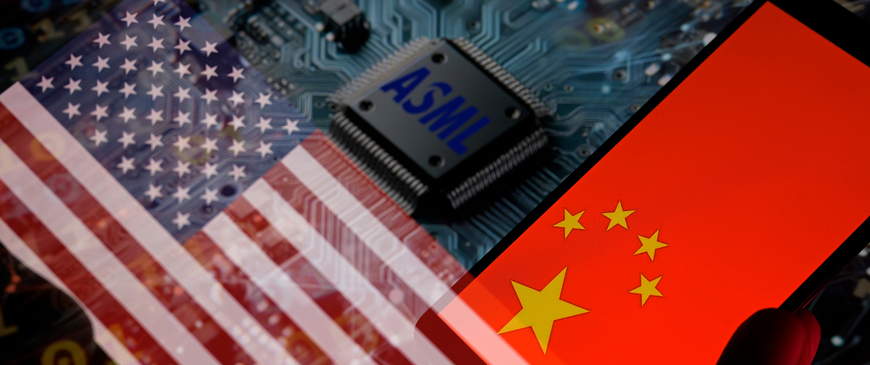
It's up to the EU to hold back the great tech decoupling
EU countries can no longer ignore growing pressure from countries seeking a tougher line on China, nor can they ignore China’s efforts to replace Western firms in high-tech supply chains. Instead, they should hand over more powers to Brussels so the EU can protect its members from US export controls, write Sander Tordoir and Zach Meyers.
US leaders insist they want to “de-risk” and not “decouple” from China, meaning they only seek to limit exports and imports for a small number of sensitive goods. As this “small yard with a high fence” expands, it is ensnaring Europe’s few global technology leaders.
Until now, the US has mostly targeted the Dutch government to undermine China’s chip-making capabilities. Washington persuaded the Netherlands to adopt increasingly tough licensing requirements for ASML, the only firm which can build manufacturing equipment for the most advanced chips when it exports to China.
But the US was not satisfied, fearing that Chinese companies will eventually replicate ASML’s chipmaking technologies. In order to do that, Chinese firms would have to replicate the entire ASML supply chain – which involves about 5,000 direct suppliers of highly specialised inputs.
To prevent Chinese companies from getting access to those suppliers, Washington is now trying to impose controls on them, such as German manufacturing firms Zeiss and Trumpf, as well as chemical producer BASF.
Germany has so far resisted both US controls and European Commission efforts to build a meaningful economic security strategy, under which decisions about export controls would be made in Brussels.
Instead, determined to press on with a business model that relies on extensive trade and investment ties with China, Germany has been negotiating export controls with the US without much EU involvement.
This is no longer viable.
First, pressure within the EU for a tougher line on China is growing.
Second, as the Netherlands has already discovered, US pressure is impossible to ignore given its role as Europe’s security guarantor.
Third, China is already spending vast sums to reduce its dependencies on the West and there are doubts about the sustainability of China’s economy generally – so a business model focused on exports to China has little future.
Handing over export controls to Brussels would force the EU to identify its interests as a bloc and define a strategy. Some businesses may dislike the outcome, but they would at least have more certainty and consistency.
Greater EU unity would reduce the ability of the US to lean on individual member-states and continue its strategy of repeatedly pushing out the edges of its supposedly small yard.
Bringing other European countries to the decision table might carry the risk that they care more about transatlantic relations than maintaining the EU’s strengths in the chip supply chain.
But chip-making firms are vital for Europe’s strategic autonomy. The whole continent has a stake in the ASML’s success, given its supply chains run across Europe, and without a well-defined limit to export controls, other firms could quickly get drawn in too.
Furthermore, boosting the bloc’s leverage could help the EU persuade the US to agree to set up a club of like-minded and allied countries based on a well-defined small yard.
Such a club could guarantee mutual access to chip technology among its members, better coordinate subsidies between participating countries, and create more transparency about how countries are applying export controls in practice.
A club is essential because between the EU, the US, Japan, South Korea and Taiwan, there are dependencies and chokeholds all across the chip value chain. The US leads the world in chip design and chip-making software tools.
Taiwan produces more than 60% of all semiconductors, including the most advanced ones. South Korea dominates the global memory chip market.
Japanese firms have monopolistic market positions in specialised equipment and chemicals for semiconductor manufacturing, for example, to inspect ASML machines.
While the EU has its own chokepoints, like ASML’s machines, it produces only 10% of the global chips supply. Germany and the Eastern European industrial hinterland that supplies it require a reliable supply of chips to build cars and machinery.
Europe needs its allies and its allies need Europe.
A patchwork of bilateral agreements between the various chip-producing blocs will not lead to enough coordination and could encourage free-riding.
Only a club can increase export controls’ effectiveness, avoid the overlap of subsidies, and boost transparency, to ensure that some club members are not using the controls to gain an unfair advantage over for example the EU.
This strategy has a good chance of surviving a second Trump presidency. Trump would find it difficult to snub a club that included many US allies with their own chokepoints in the chip-making supply chain. He would face significant pressure from America’s tech leaders to respect any club arrangement.
The EU is often only as strong as its weakest link when it comes to standing up to Washington and Beijing. Decision-making about economic security needs to be Europeanised. With the EU-friendly Biden administration on the other side of the table they have a chance to succeed.
A much more hostile Trump presidency might be only months away. The clock is ticking.
Sander Tordoir is senior economist at the Centre for European reform where he covers EU fiscal and industrial policy. Zach Meyers is Assistant Director at the Centre for European Reform where he works on EU competition and technology policy.
